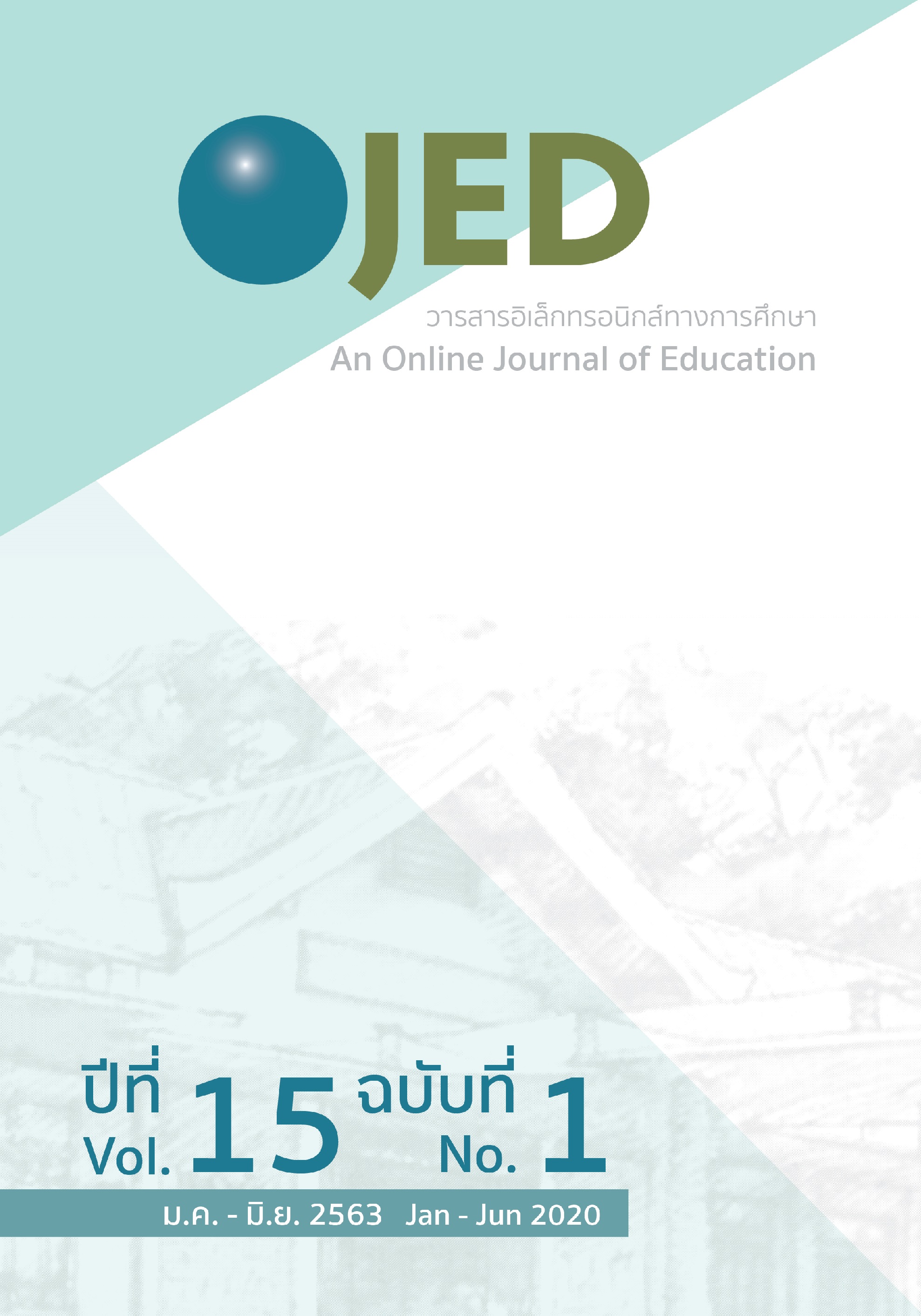Sustainable Cultivation Process of Family, School and Community to Enhance the Sufficiency Behavior of Children
DOI:
https://doi.org/10.14456/ojed.2020.1Keywords:
CULTIVATING PROCESS, SUFFICIENCY BEHAVIORAbstract
In this study, the research objective is to analyze sustainable cultivation process of family, school and community to enhance the sufficiency behavior of children. The researcher interviewed 4 experts to acquire the data used in the study, which were collected, analyzed and summarized. In the context of child-rearing, cultivating refers to bringing up and developing the child to achieve good habits that are deep-seated. The process of cultivation refers to procedures used in the cultivation of sufficiency behavior, which comprise 4 steps: provoking thought, planning, action and evaluation. Additionally, the factors of sufficiency behavior cultivation process mentioned in this study are reinforcement, children’s knowledge and understanding, cultivator’s knowledge and understanding, the relationship between the cultivator and children, the understanding of the child nature, the individual difference behavior, being a good model, continuation of period, and supports. Conditions of sufficiency behavior cultivation process are the influence of social media consumption on behavior, not being open-minded to new things, child-rearing practices, and relationships between people in the community.
References
กมลาศ ภูวชนาธิพงศ์. (2558, 2 เมษายน). วิจัยพบพุทธิปัญญาภูมิคุ้มกันวัยรุ่น ยุคบริโภคนิยม. มัชฌิมา. http://www.madchima.org/forum/index.php?topic=17101.0
ทิศนา แขมมณี. (2554). ปรัชญาของเศรษฐกิจพอเพียง: จากหลักคิดสู่วิถีปฏิบัติ. อมรินทร์พริ้นติ้งแอนด์พับลิชชิ่ง.
ทิศนา แขมมณี. (2559). ถอดรหัสปรัชญาของเศรษฐกิจพอเพียงสู่การสอนกระบวนการคิด (พิมพ์ครั้งที่ 3).สำนักพิมพ์แห่งจุฬาลงกรณ์มหาวิทยาลัย.
ทิศนา แขมมณี และ คณะ. (2550). กิจกรรมการปลูกฝังค่านิยมเศรษฐกิจพอเพียง สำหรับนักเรียนระดับประปฐมวัยและประถมศึกษา. ศูนย์ส่งเสริมวิชาการ.
ทัศนียา บริพิศ. (2556). วัฒนธรรมบริโภคนิยม ทุนนิยม และสัญญะ. สารอาศมวัฒนธรรมวลัยลักษณ์ มหาวิทยาลัยวลัยลักษณ์, 14(1), 40-41.
นภเนตร ธรรมบวร. (2541). การประเมินผลพัฒนาการเด็กปฐมวัย. สำนักพิมพ์แห่งจุฬาลงกรณ์มหาวิทยาลัย.
ปรียานุช ธรรมปิยา. (2558). การขับเคลื่อนปรัชญาเศรษฐกิจพอเพียงด้านการศึกษา (พ.ศ. 2549- พ.ศ. 2557) (พิมพ์ครั้งที่ 2). ศูนย์การพิมพ์เพชรรุ่ง.
วีรยุทธ วิเชียรโชติ. (2548). เทคนิคการเรียนการสอนแบบอารยวิถี ในกระบวนวิธีสืบสวน-สอบสวน เพื่อการพัฒนา เบญจลักษณะ. ก้าวใหม่.
ภัทริกา วงศ์อนันต์นนท์. (2557). พฤติกรรมการใช้อินเทอร์เน็ตของเด็กและเยาวชน. วารสารพยาบาล ทหารบก. 15(2), 173-178.
สุนันทา สิริโสภณ. (2553). เลี้ยงลูกให้เป็นอัจฉริยะ. ทีบีเค มีเดีย.
โสภิตนภา ภิญโญ. (2552). 101 วิธี สอนลูกให้ยืนบนขาตัวเองได้. พิมพ์ดี.
ศูนย์คุณธรรม (องค์การมหาชน). (มิถุนายน, 2560). สถานการณ์คุณธรรมและขับเคลื่อนสังคมคุณธรรม 8 จังหวัดภาคเหนือตอนล่าง. ใน ธนะศักดิ์ ปฏิมาประกร (ประธาน), รวมพลังประชารัฐขับเคลื่อนสังคมคุณธรรม: พอเพียง วินัย สุจริต จิตอาสา. เอกสารประกอบการประชุมของ(ศูนย์คุณธรรม (องค์การมหาชน), ศาลาสภาบริหารคณะสงฆ์จังหวัดพิจิตร วัดท่าหลวง พระอารามหลวง อำเภอเมือง จังหวัดพิจิตร.
ศูนย์โรงเรียนคุณธรรม มูลนิธิยุวสถิรคุณ. (2560). ช่วยกันสร้างคนดีให้บ้านเมือง ชุมชนคุณธรรม (พิมพ์ครั้งที่ 2). สหมิตรพริ้นติ้งแอนด์พับลิสชิ่ง.
Dharmapiya, P., & Saratun, M. (n.d.). Cultivating a sufficiency mindset. http://www.environnet.in.th/wp-content/uploads/2016/11/002-Cultivating-a-Sufficiency-Mindset-Thailands-Educational-Strategy-for-a-Sustainable-Society.pdf
Downloads
Published
How to Cite
Issue
Section
License
Copyright (c) 2020 An Online Journal of Education

This work is licensed under a Creative Commons Attribution-NonCommercial-NoDerivatives 4.0 International License.




